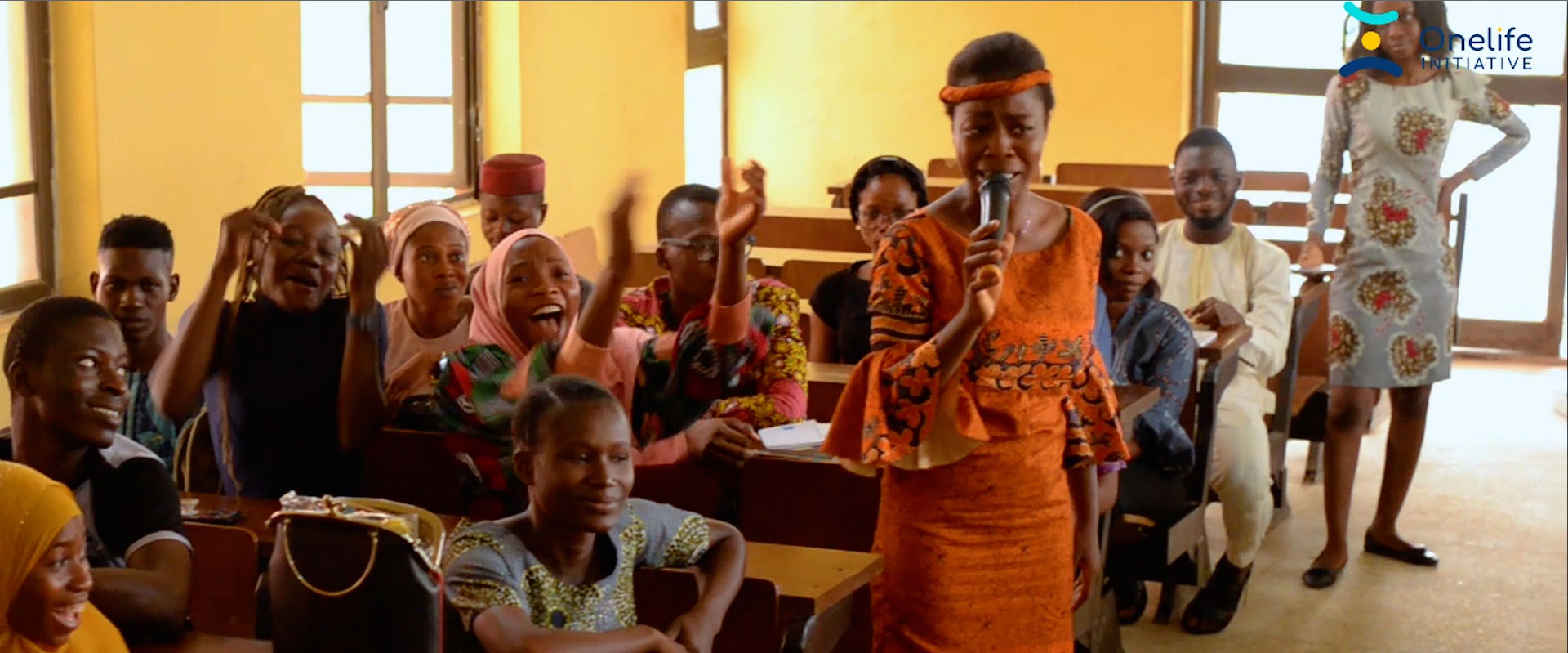Ipas’s local partner, Onelife Initiative for Human Development, has helped Nigerian college students take control of their sexual and reproductive health through a program called “Campus Wey Sabi,” a title which loosely translates to “campus that knows.” Through measuring student knowledge, training local health-care vendors, and hosting on-campus sessions with students and health providers, the program achieved significant results in just four months.
Onelife Initiative, based in Southwest Nigeria, educates youth on issues that affect their futures, like preventing unplanned pregnancies and unsafe abortions. With funding from the Ipas Collaborative Fund, they were able to pilot their “Campus Wey Sabi” program. The Collaborative Fund provides no-strings-attached grants to local organizations like Onelife that work to advance reproductive justice in their communities.
“We’re proud to have partnered with Onelife Initiative,” says Doris Ikpeze, partnerships and program manager for Ipas Nigeria Health Foundation. “The success of Campus Wey Sabi proves that young Nigerians understand that accurate sexual and reproductive health and rights information—and prevention of the harms of unsafe abortion methods—is a critical resource for their futures.”
Reaching off-campus college students
In Nigeria, abortion is only permitted to save a woman’s life, leading many to resort to unsafe methods that can result in death or injury, which contributes to the high maternal death rate in the country. Young college students can be particularly at risk for unintended pregnancy and unsafe abortion if they don’t have access to accurate information and health care.
For many Nigerian students, attending college means they have to live off-campus and further from campus health resources and accurate sexual and reproductive health information. Until the Campus Wey Sabi program, there were no comprehensive sexuality education programs available for college students that included information about the risks of unsafe abortion and the importance of postabortion care (treatment for complications from unsafe abortion). To fill this gap, Onelife approached the issue from three separate angles to make the biggest impact:
1. Bringing students and experts together
Campus Wey Sabi organized four-hour sessions of learning and discussion near six different colleges, using Facebook to reach students who couldn’t attend in person.
Local gynecologists and obstetricians were there to educate students on how to prevent unplanned pregnancy and the risks of unsafe abortion, highlighting the lifesaving importance of quality postabortion care. The popularity of the program drew students from additional colleges, allowing Campus Wey Sabi to reach 601 students from 12 different colleges.
Engaging discussions covered various sexual and reproductive health topics, including sexual violence, choices of pregnancy prevention, the process of adoption and how to access postabortion care if unsafe procedures were used. Male students were also involved in conversations addressing rape and unplanned pregnancies, strengthening their understanding and equipping them to better advocate for change in their communities.
“I shared the information with seven of my friends. We discussed options girls normally have in mind during unplanned pregnancy.”
—Female student, group discussion participant
“I shared information with friends. We discussed menstrual health, the counting method of knowing when (sex) is safe or not, and unsafe abortion.”
—Female student, group discussion participant
2. Measuring impact and creating a safe space for student questions
Through pre- and post-tests, Onelife Initiative noted a significant shift in students’ awareness. Initially, over half of attending students were unaware that safe, legal abortion services are available under limited circumstances, a number that was greatly reduced after the sessions.
Anonymous question boxes provided safe spaces for students to inquire without fear of privacy breaches. One student, for example, who had undergone seven unsafe abortions resulting in the loss of her uterus, sought guidance on her reproductive future. Over the span of the program, a total of 239 anonymous questions were addressed openly during the program sessions.
3. Improving local resources that students can access
Campus Wey Sabi partnered with local Patent and Proprietary Medicine Vendors (PPMVs), training them to offer sexual and reproductive health information and services. PPMVs, approved by the Nigerian government, serve as accessible sources of over-the-counter medicines and basic health care in rural or underserved regions where formal health care is lacking. Their presence helps bridge gaps in access to pharmacies or clinics, ensuring more individuals receive necessary health care services.
“I have been able to train other [patent and proprietary medicine vendors] (PPMVs): 321 of them.”
—PPMV in Igbo-Ora, Oyo state
“A student came and explained that she had missed her period, but she didn’t have money to help herself and she is just in year 2. So, I provided support for her at a discounted price, and followed up with her until she stopped bleeding.”
—PPMV in Uyo, Akwa Ibom state
Expanding Campus Wey Sabi
Campus Wey Sabi received local media attention, helping Onelife attract volunteers for its other on-campus initiatives. Leadership from three campuses served by Campus Wey Sabi requested further projects from Onelife. In addition, this pilot initiative enabled Onelife’s first outreach to Akwa Ibom state, where they had not previously worked, and Onelife now aims to expand Campus Wey Sabi to additional campuses across Nigeria.
“I’ve learned a lot of things, from my menstrual cycle to my sex life,” shares a young woman in the video below about Campus Wey Sabi. “I wish we did not stigmatize these things. People have a lot of choices and come into contact with a lot of things in their lives. After this program, I will not ever stigmatize anybody I see. And I learned my body is my right.”


